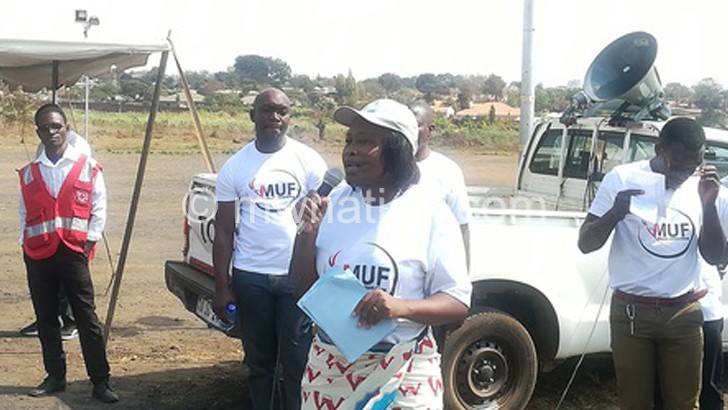Govt officials, NGOs in march for Lilongwe City
Senior government officials, including Principal Secretary in the Ministry of Lands, Housing and Urban Development Janet Banda, on Saturday marched in Lilongwe to raise awareness on the importance of proper planning and construction of structures.
Dubbed Malawi Urban Walk, the march was held in preparation for the Urban Forum for Inclusive, Safe, Resilient and Sustainable Cities and Human Settlement in Malawi scheduled for Wednesday in Lilongwe.
Speaking at the end of the march, Lilongwe City deputy mayor Juliana Kaduya warned residents of Lilongwe against building structures in places not designated by the city council.

“Let us keep the city clean and orderly. It is important to adhere to the city planning when erecting structures,” she said.
On her part, Banda said Sustainable Development Goal number 11, which is about making cities inclusive, safe, resilient and sustainable, cannot be achieved without significantly transforming the way we build and manage our urban spaces.
“Making cities safe and sustainable means ensuring access to safe and affordable housing, and upgrading slum settlements. We all need to join hands and play our respective role in making our cities better,” she said.
Habitat for Humanity national director Kelvin Kalonga said Malawi should be more practical than rhetorical in the implementation of the city action plan.
Other participants in the march were Kaduya, representatives from World Bank, Habitat for Humanity and Centre for Community Development (Ccode)
Sexual, reproductive health rights vital—official
International Organisation of Migration (IOM) regional migration health manager Francis Bwambale has said access to sexual and reproductive health and rights (SRHR) services is key to combating HIV and Aids.
He said this on Thursday in Salima at the opening of the second national level multi-sectoral dialogue on migration and sexual reproductive health (SRH) issues.
Bwambale said IOM is implementing the SRHR/HIV Knows No Borders project as one of the regional initiatives in the Southern Africa Development Community (Sadc) region.
The project attempts to address inequalities in access to and utilisation of HIV and SRH services, especially among the migrants and migration affected communities.
“This is why we urge governments in the Sadc region to ensure that no one is left behind in the access to SRH services through creating an enabling environment to address social and policy barriers that prevent vulnerable populations to access the services,” he said.
Bwambale said to achieve this there is need for multi-sectoral approach among stakeholders in SRHR issues in the cross border corridors of Mchinji, Mwanza and Neno.
National programme officer for Adolescents and Youth for SRHR in the Ministry of Health Hans Katengeza said government urged delegates to the dialogue meeting to come up with interventions that can reduce the risk of HIV and Aids in border district.
“We need to critically to look into problems hindering the migrants and people living in border districts from accessing SRHR services,” he said.—Malawi News Agency





